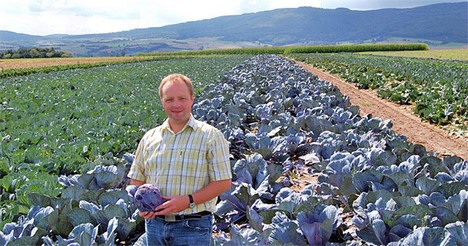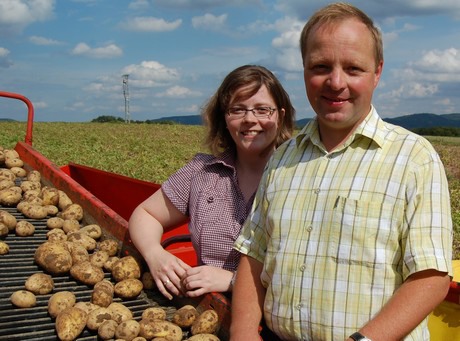The current second lockdown and the stricter Corona regulations are particularly hard on medium-sized companies in the food industry. Apart from massive losses in turnover in the course of the ongoing gastro-closure, the quantity purchase and thus the planning security have also been completely thrown overboard. But after Easter there will probably be the first improvements, says Bernd Gläßner, vegetable farmer and regional supplier in Berkatal, Hesse.
"Our sales have been cut in half due to Corona," says Gläßner, who supplies both home-grown produce and bought-in fresh produce to the catering, weekly market and wholesale sectors. "We are sitting on large stocks, whether of cabbage vegetables or potatoes. There are simply no volume items in these times of Corona. Unfortunately, this is also reflected in the volume purchase per delivery."

Bernd Gläßner in the cabbage field: During the cold season, the greengrocer offers various types of cabbage, lamb's lettuce and potatoes from his own cultivation / Photo: B. Gläßner
Mutual synergy is missing
On the other hand, certain sales areas benefit from the Corona crisis. "Weekly market stallholders made good money, especially during the first lockdown. It is estimated that sales were a quarter above the normal level. From December onwards, this increase in turnover flattened out again somewhat. From my point of view, however, this is also related to the closed shops: As the weekly market depends on city centre shops, this mutual synergy has now completely disappeared."
Trial with vegetable crates
Gläßner also knows that the situation is even more difficult in the local gastronomy and with their suppliers. "Most of them have been able to keep their business afloat by means of financial support and staff layoffs. We suppliers, on the other hand, can only get subsidies if our turnover drops by at least 80 per cent."
Due to the difficult financial situation, the vegetable trader already looked for other sales channels during the first lockdown, for example in the distribution of vegetable boxes for private buyers. "However, this has not been profitable enough, probably because people compare us to discounters in terms of price. We have had to realise that the demand for such services in rural areas is simply too small compared to urban areas," says Gläßner, who discontinued box sales after a short time.

Potato sorting
First upward trend from Easter
Despite everything, the third generation of the Hessian vegetable farm is looking ahead confidently. "I expect the situation to continue until Easter. After that, of course, it won't be possible to go full throttle immediately, but I would hope that there will be a first slight upward trend from April onwards."
For more information:
Fruchthandel Gläßner
Bernd Gläßner
Stadtweg 13
37297 Berkatal-Hitzerode
Tel.: 0 56 52 - 58 99 88
info@fruchthandel-glaessner.de
www.fruchthandel-glaessner.de
